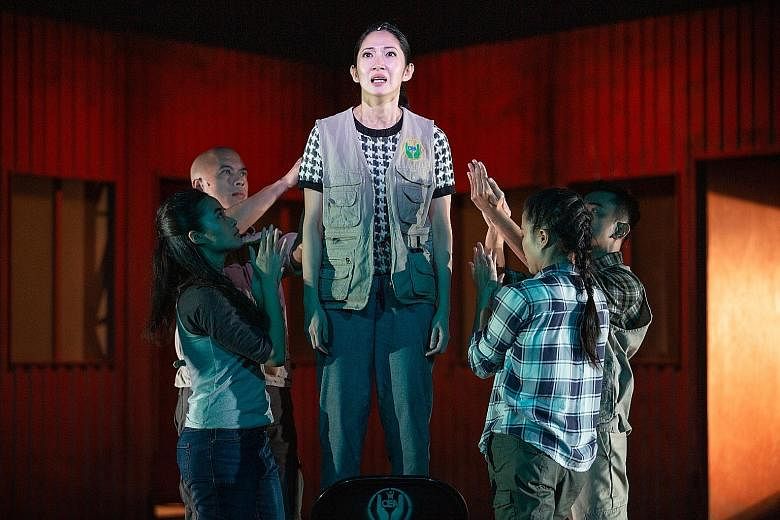Displaced Persons' Welcome Dinner is a masterclass in supply chain management and the necessity of developing sustainable, ethical business and governance models.
Written by Huzir Sulaiman and directed by Claire Wong, the action plays out within the framework of humanitarian operations carried out by a fictional aid body, the OEA, short for Organisation for Emergency Assistance.
At the head office in safe, sanitary Geneva, aid workers relive a traumatic experience in the field.
Meanwhile, field action is regularly buried in corporate activity and on-the-ground red tape.
Funding for new latrines must be substantiated by data detailing the number of people in need. Food supplies for the thousands in the refugee settlement must come in via trucks and with the approval of whichever militia is in charge at different roadblocks.
This is not supply chain management as it is taught in college, notes logistics coordinator Hamid (played subtly and effectively by Yazid Jalil).
-
REVIEW / THEATRE
-
DISPLACED PERSONS' WELCOME DINNER
Checkpoint Theatre Singapore International Festival of Arts/Victoria Theatre/Last Friday
It is a complex operation with many moving parts. When even one step is compromised for the sake of expediency or economy, the entire structure can come crashing down, as the audience sees.
Displaced Persons' Welcome Dinner is a fascinating look into the world of humanitarian workers and a metaphor for the systems under which our world operates.
The work of the OEA is the work of any government in miniature as it provides essential services to thousands of persons, juggles multiple competing demands with time and budgetary constraints and makes difficult decisions about which needs are less pressing than others.
What if the head of operations is a rapist? Removing him will further delay the provision of food, medical care and sanitation to many. The old ethical problem of sacrificing the few for the greater good plays out hourly.
The aid workers make their choices and press on with their work, while carrying the guilt. They do not need to hear every sob story to do their jobs, as Hamid notes. The job of caring for as many as possible will be done, regardless.
The play is brilliantly acted and beautifully presented.
Lighting (Lim Woan Wen) and sets (Wong Chee Wai) take us from makeshift offices in containers to up-scale Geneva in a heartbeat.
Director Wong's signature physical theatre complements and contradicts the text, as do the haunting melodies of composers and live performers .gif (Chew Wei Shan and Nurudin Sadali), who perform with assistant director Anthea Julia Chua.
That said, Hamid's statement should have been taken to heart. Not every sob story needed to be heard to ensure the play did its job and the 135-minute run-time could have been used better.
It would have worked to the play's advantage to better establish the under-utilised Daisy Irani as Shirin Mistry, the epitome of corporate governance.
Shirin shutting down the recollection of aid worker Sara midway through the play would have had greater impact, if Sara (played viscerally and unforgettably by Dawn Cheong) had indeed been shut up, instead of granted a gratuitous monologue.
It was a missed opportunity to underline the power play at the end, when Shirin again attempts to silence Sara's allegations against senior management.
Sara's story poses the question every system of governance needs to ask itself: Do ends ever justify the means taken to achieve them? If the system is working for many, should it be challenged or destroyed to save just a few?
Displaced Persons' Welcome Dinner frames the question so well that there is no single, absolute answer. One's response changes based on one's place in the hierarchy and recognising this is the real horror at the heart of the play.


